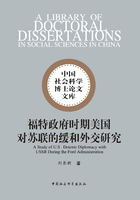
第5章 Abstract
Abstract:The U.S.-Soviet relations are the main line of both their respective foreign relations and the post-war international relations.In each phase of the Cold War,the Competition between the U.S.and the Soviet Union shows different manifestations,among which containment and confrontation has been the mainstream of the U.S.-Soviet relations before late 1960s.After Nixon took office,the relations between the U.S.and the Soviet Union entered the stage of detente due to domestic and international factors.Because the United States has not been revitalized,as well as its domestic political reasons,the Ford administration inherits the detente policy to seek to safeguard the country's stability and to constrainthe Soviet Union's expansion.Accordingly,Ford has kept a close cooperation with the Soviet Union on limiting strategic arms negotiation,European security issues and central Europe disarmament negotiation,and positive results have been achieved.However,the fundamental differences between the two countries have not been eliminated,the U.S.did not give up its containment toward the Soviet Union,who also did not change its fundamental goals of communism expansion in the global world,so the two sides were in detente while cannot avoid competition and confrontation at the same time,and as time goes by,the competition and confrontation between the two countries gradually enhanced.The conflicts and contradictions on SALT,normalization of trade relations and the war in Angola indicated the severe challenges faced with the detente.The U.S.-Soviet relations reached a turning point in 1976,and the differences between the two countries widened with the development of the world situation and the Ford administration ultimatelyhad abandoned the detente diplomacy under the domestic and international pressure.This paper argues that the detente diplomacy have experienced a critical transition period during the Ford administration,and the relaxation of this period is part of the U.S.-Soviet detente in the 1970s,and is the strategic adjustments that U.S.government have made to adapt to the changes in international and domestic situation.While the detente diplomacy has been inherited from Nixon,they do have a different place;meanwhile,the decline of detente is also the results of a combination of factors.In terms of its effectiveness,although it failed to contain the expansion of the Soviet Union in short term,this policy has led to the change of the Soviet at last,and also promote the detente of international situation,so its positive significance cannot be overlooked and underestimated.